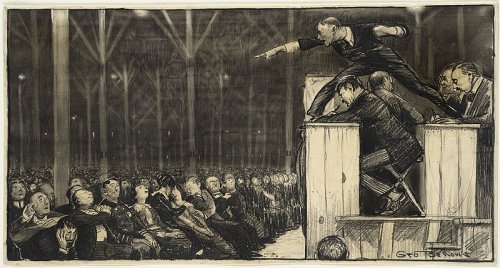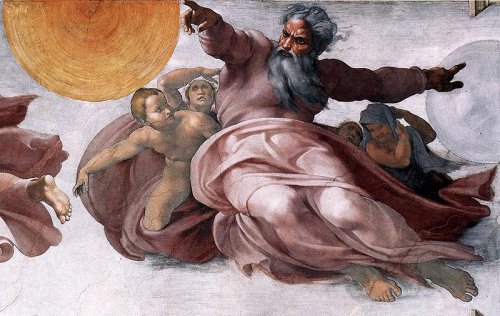This “parable against persecution” was a favorite of Benjamin Franklin, who would sometimes pretend to recite it out of a Bible as “the 51st chapter of Genesis.” He wrote that “the remarks of the Scripturians upon it … were sometimes very diverting”:
1. And it came to pass after these things, that Abraham sat in the door of his tent, about the going down of the sun.
2. And behold a man, bowed with age, came from the way of the wilderness, leaning on a staff.
3. And Abraham arose and met him, and said unto him, ‘Turn in, I pray thee, and wash thy feet, and tarry all night, and thou shalt arise early on the morrow, and go on thy way.’
4. But the man said, ‘Nay, for I will abide under this tree.’
5. And Abraham pressed him greatly; so he turned, and they went into the tent; and Abraham baked unleavened bread, and they did eat.
6. And when Abraham saw that the man blessed not God, he said unto him, ‘Wherefore dost thou not worship the most high God, creator of heaven and earth?’
7. And the man answered and said, ‘I do not worship the God thou speakest of; neither do I call upon his name; for I have made to myself a God, which abideth alway in mine house, and provideth me with all things.’
8. And Abraham’s zeal was kindled against the man; and he arose, and fell upon him, and drove him forth with blows into the wilderness.
9. And at midnight God called unto Abraham, saying, ‘Abraham, where is the stranger?’
10. And Abraham answered and said, ‘Lord, he would not worship thee, neither would he call upon thy name; therefore have I driven him out from before my face into the wilderness.’
11. And God said, ‘Have I borne with him these hundred ninety and eight years, and nourished him, and clothed him, notwithstanding his rebellion against me; and couldst not thou, that art thyself a sinner, bear with him one night?’
12. And Abraham said, ‘Let not the anger of my Lord wax hot against his servant; lo, I have sinned; forgive me, I pray thee.’
13. And Abraham arose, and went forth into the wilderness, and sought diligently for the man, and found him, and returned with him to his tent; and when he had entreated him kindly, he sent him away on the morrow with gifts.
14. And God spake again unto Abraham, saying, ‘For this thy sin shall thy seed be afflicted four hundred years in a strange land;
15. ‘But for thy repentance will I deliver them; and they shall come forth with power, and with gladness of heart, and with much substance.’




